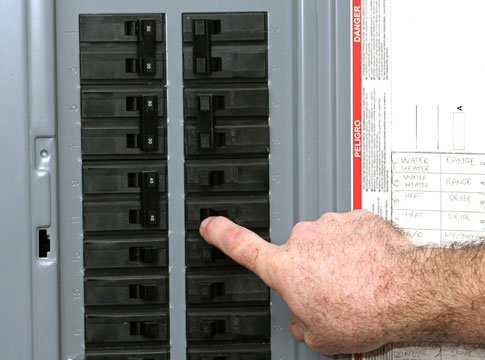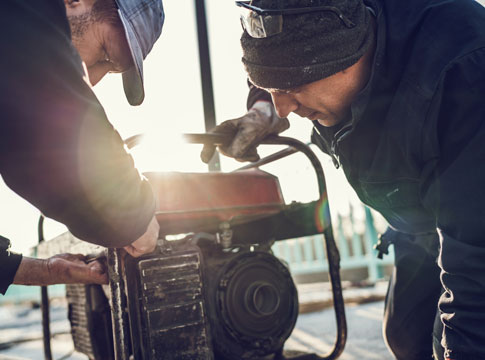Related News
Related News
-
EWEB reaffirms commitment to resilience with Wildfire Mitigation Plan approval
The utility is testing new equipment, leveraging technology, and incorporating third-party expertise to bolster electric system resiliency to a range of threats, including wildfire.
Find Out More -
Water professionals showcase skills in Cascade to Coast Competition
Representatives from local utilities competed to see who has the best-testing water, who can assemble a water meter the fastest and who find the most creative way to solve a routine problem that water utility professionals often face.
Find Out More -
Energy conservation could offset large portion of growth in power demand
Preliminary results of an EWEB study indicate that cutting back demand can contribute to maintaining a reliable, affordable energy supply.
Find Out More -
Small number of McKenzie Valley EWEB customers face higher February bills due to estimated reads
EWEB under-estimated energy usage for about one-fifth of upriver customers in December or January, resulting in higher true-up bills in February.
Find Out More -
EWEB offers Greenpower Grant to support local sustainability project
The Greenpower Grant, funded by voluntary customer subscriptions to Greenpower, not customer grants, supports projects that advance renewable energy, clean energy education or efforts to reduce or offset local carbon emissions.
Find Out More -
Rising Together: Female operation staffers begin industry mentorship program
One week into Women's History Month and just before International Women's Day on March 8, three women in EWEB leadership roles embarked on a 10-month-long journey of mentorship, fellowship, and professional development.
Find Out More -
EWEB and BRING cook up new ways to help Eugene businesses save energy
Businesses can cut energy costs with EWEB’s free Energy Assessments and efficiency programs. Plus, for a limited time, BRING is offering $1,000 rebates for qualifying upgrades—apply by Feb. 28!
Find Out More -
PNW Lineman Rodeo raises $85,000 for Oregon Burn Center
EWEB line techs are proud partners and participants in the rodeo fundraiser every year.
Find Out More -
Eugene residents share energy and water saving tips
From blocking a draft to replacing your heating system, each action you take can save water and electricity.
Find Out More -
EWEB customers and employees share the love through Energy Share donations
EWEB budgets funding to help customers struggling to pay their utility bill, but the need is always greater than what we can provide alone. Energy Share, our customer donation funded program helps fill the gap.
Find Out More -
Energy demand reaches highest level in nearly a decade as utility prepares for ice
Frigid temperatures in the low 20s caused surging electricity demand in early February.
Find Out More -
EWEB leverages Oregon Clean Fuels Program to support electric mobility
Five grants support programs benefiting homeless youth and bike sharing, among others.
Find Out More -
Frigid weather drives highest energy demand of the winter so far
Peak electricity demand this season surpasses demand levels during last year’s ice storm.
Find Out More -
Cold Weather, Higher Energy Bills: Why It Happens
Eugene is experiencing some of the coldest temperatures we've seen this winter. When temperatures drop into the 20s, heating systems must work much harder to keep homes warm. Even if you leave your thermostat untouched, your heating system will consume more energy to maintain a steady indoor temperature as the outdoor temperature plummets.
Find Out More -
Recovery still ongoing on the anniversary of the 2024 Ice Storm
Cost of rebuilding EWEB's electrical system will surpass $11 million
Find Out More - Show More
Let's talk turkey. If a disaster strikes, is your family ready?
November 16, 2023 • Robyn Smith, EWEB Communications

Many of us avoid discussing politics over the dinner table in the spirit of family peace and harmony. But here's a topic that can bring everyone together: emergency preparedness.
Thanksgiving is a perfect time to make or refresh your emergency plans. As you pass around the turkey and the pumpkin pie, talk with your family about what you would do in an emergency such as an ice storm or other disaster. Developing a plan can help ensure your family's safety and comfort during a winter storm that could knock out the electricity or water for days or even longer.
Put together a plan by discussing these six questions with your family:
How will we receive emergency alerts and warnings?
Many mobile devices will now bring you wireless emergency alerts—real-time information directly from local and federal sources. Check out these alert options:
Lane Alerts – Lane Alerts allows fire, police, and other emergency response agencies to issue alerts to residents in the event of severe weather, fire, flooding, hazardous materials, need for immediate evacuation, civil danger, local area emergencies, and missing persons.
In the event of an emergency, alerts will be delivered to you at the contact information you provided, including telephone, text messages and email. Learn more about receiving emergency alerts.
ShakeAlert – Because Minutes Matter. – The ShakeAlert Earthquake Early Warning System, managed by the U.S. Geological Survey, detects significant earthquakes quickly enough so that alerts can be delivered to people potentially seconds before shaking arrives. The purpose of the system is to reduce the impact of earthquakes to save lives and property. Learn more about how to prepare for an earthquake.
FEMA Mobile App – Learn what to do before, during, and after emergencies with safety tips, and receive weather alerts from the National Weather Service.
Update your EWEB account – To avoid steps during a power outage, please make sure your current cell phone number(s) are tied to your EWEB account. Call Customer Service at (541) 685-7000 or email EWEB.Answers@eweb.org to update your account.
What is our shelter plan?
Depending on your circumstances and the nature of the emergency, it may be best to stay where you are and avoid any uncertainty outside by "sheltering in place." Do you have an emergency stock of food, water, medicines, fuel and other supplies? If you needed to leave home, where would you go? To a family member or friend's home? A hotel? A shelter? Where is the closest public shelter located? Consider your options and discuss with your loved ones in advance. Learn more about how to build an emergency preparedness kit.
What is our evacuation route?
In a natural disaster, some roads and bridges may be unpassable. It's smart to plan ahead for a few different route options to your shelter location. Keep a map in your car in case your mobile navigation is unavailable. Build an emergency plan and share it with family members.
What is our family communication plan?
In an emergency, many people trying to use their mobile phones and landlines at the same time may create network congestion. Have a conversation with your family and agree on a plan for how you will communicate and reconnect. Here are some tips to consider:
- Create an emergency text message group. In many cases, text messages will go through when your call may not. If you have an “Emergency Text Group” already on your phone, reaching your loved ones in an emergency will be easier.
- Designate someone who lives outside of the area as a central contact, and make certain all family members know who to contact if they become separated.
- Agree on a meeting place in case you cannot connect via phone, text, or email.
- Keep portable cell phone power banks in your car, backpacks, etc.
- Make sure each family member has a printed list of phone numbers in case your cell phones aren't working.
What is our plan for loved ones with special needs?
Customers dependent on power for special medical equipment should have a plan for power outages. Talk to your medical provider about a power outage plan for medical devices powered by electricity and refrigerated medicines. Find out how long medication can be stored at higher temperatures and get specific guidance for any medications that are critical for life.
How can we prepare for a power outage?
Winter is coming, which increases the likelihood of storm-related power outages. It's important to be prepared, and there are simple actions you can take right now.
- Consider purchasing a backup generator and make sure your loved ones know how to use it safely. Learn more about generator safety.
- Have enough nonperishable food and water. Keep freezers and refrigerators closed. The refrigerator will keep food cold for about four hours. A full freezer will keep the temperature for about 48 hours. Monitor temperatures with a thermometer. Throw out food if the temperature is 40 degrees or higher.
- Install carbon monoxide detectors with battery backup in central locations on every level of your home. Avoid carbon monoxide poisoning. Generators, camp stoves or charcoal grills should always be used outdoors and at least 20 feet away from windows. Never use a gas stovetop or oven to heat your home. Turn off or disconnect appliances, equipment, or electronics. Power may return with momentary surges or spikes that can cause damage.
- Stock up on batteries and power banks to recharge cell phones and other electronic devices.
- Buy a battery-powered radio to receive updates if the power is out for an extended period of time.
- Keep your fuel tanks full. If the power goes out, you may want to use your grill or camp stove for cooking, so ensure you have an adequate fuel supply on hand. It's also a good idea to keep your car's tank full since gas station fuel pumps rely on electricity. If you have an Electric Vehicle, charge it up ahead of predicted storms.
- Ensure you know how to manually open and close your garage door or park your car outside ahead of a winter storm.
Learn more about power outage resources, including how to report an outage, see outage updates, and what to do if you see a downed power line here.
And don't forget your emergency kit! EWEB has a 12-month Pledge to Prepare Campaign to help you build up your emergency kit, and you can sign up for a monthly emailed checklist here.
Related Programs
We regularly receive reports of power outages that are actually a tripped breaker on the customer's circuit panel. Checking your circuit panel before reporting an outage can save you hassle and money.



